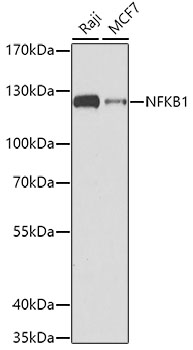Product Detail
Product NameNFKB1 Rabbit Polyclonal Antibody
Host SpeciesRabbit
ClonalityPolyclonal
IsotypeIgG
PurificationAffinity purification
ApplicationsWB,IHC,IF
Species ReactivityHuman
Immunogen DescRecombinant fusion protein of human NFKB1 (NP_001158884.1).
ConjugateUnconjugated
Other NamesNFKB1;CVID12;EBP-1;KBF1;NF-kB1;NF-kappa-B;NF-kappaB;NFKB-p105;NFKB-p50;NFkappaB;p105;p50
Accession NoSwiss Prot:P19838
GeneID:4790
Uniprot
P19838
Calculated MW85kDa/105kDa
Sdspage MW120kDa
FormulationBuffer: PBS with 0.02% sodium azide,50% glycerol,pH7.3.
StorageStore at -20˚C. Avoid freeze / thaw cycles.
Application Details
WB 1:500 - 1:1000
IHC 1:50 - 1:200
IF 1:20 - 1:100
IP 1:20 - 1:50
Immunofluorescence analysis of MCF7 cells using NFKB1 .
Western blot analysis of extracts of various cell lines, using NFKB1 at 1:1000 dilution.
Immunohistochemistry of paraffin-embedded human tonsil using NFKB1 at dilution of 1:200 (40x lens).
This gene encodes a 105 kD protein which can undergo cotranslational processing by the 26S proteasome to produce a 50 kD protein. The 105 kD protein is a Rel protein-specific transcription inhibitor and the 50 kD protein is a DNA binding subunit of the NF-kappa-B (NFKB) protein complex. NFKB is a transcription regulator that is activated by various intra- and extra-cellular stimuli such as cytokines, oxidant-free radicals, ultraviolet irradiation, and bacterial or viral products. Activated NFKB translocates into the nucleus and stimulates the expression of genes involved in a wide variety of biological functions. Inappropriate activation of NFKB has been associated with a number of inflammatory diseases while persistent inhibition of NFKB leads to inappropriate immune cell development or delayed cell growth. Alternative splicing results in multiple transcript variants encoding different isoforms, at least one of which is proteolytically processed.
If you have published an article using product 53221, please notify us so that we can cite your literature.
et al,The role of FTO in m6A RNA methylation and immune regulation in Staphylococcus aureus infection-related osteomyelitis.
, (2025),
PMID:
39980685





 Yes
Yes



